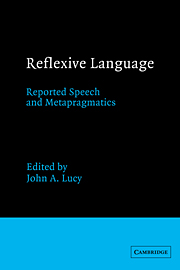Book contents
- Frontmatter
- Contents
- Acknowledgments
- General introduction
- Part I Theoretical foundations
- Introduction to Part I
- 1 Reflexive language and the human disciplines
- 2 Metapragmatic discourse and metapragmatic function
- Part II The relation of form and function in reflexive language
- Part III Text, context, and the cultural functions of reflexive language
- Part IV Interpretation, reported speech, and metapragmatics in the Western tradition
- Name index
- Subject index
2 - Metapragmatic discourse and metapragmatic function
from Part I - Theoretical foundations
Published online by Cambridge University Press: 22 January 2010
- Frontmatter
- Contents
- Acknowledgments
- General introduction
- Part I Theoretical foundations
- Introduction to Part I
- 1 Reflexive language and the human disciplines
- 2 Metapragmatic discourse and metapragmatic function
- Part II The relation of form and function in reflexive language
- Part III Text, context, and the cultural functions of reflexive language
- Part IV Interpretation, reported speech, and metapragmatics in the Western tradition
- Name index
- Subject index
Summary
The aim here is to clarify the nature of what have come to be called in the literature, following Silverstein (1976: 48–51), METAPRAGMATIC phenomena. In particular, the aim is to clarify the distinction between metapragmatic FUNCTIONS of two semiotic types and between such metapragmatic functions and metapragmatic DISCOURSE. Signs functioning metapragmatically have pragmatic phenomena — indexical sign phenomena — as their semiotic objects; they thus have an inherently “framing,” or “regimenting,” or “stipulative” character with respect to indexical phenomena. In this way, as illustrated in the accompanying chapters, the metapragmatic—pragmatic nexus lies at the intersection of specific theoretical concerns with one or another facet of the total linguistic fact. Let me point out some of these concerns.
First, there is the line of focus on the language—metalanguage relationship, coming out of the logico-linguistic tradition of analytic philosophy and formal syntax. Here, we assume that there is some language in the usual sense, i.e., some grammatically conforming system of expression-types, tokens of which refer-to some universe of referents and predicate-about some universe of states-of-affairs, and that the objects of reference-and-predication happen to be themselves grammatically conforming expressions of some language, called, by virtue of this, the OBJECT LANGUAGE of metalinguistic usage. (The expression-types that are used to refer-to/predicate-about the object language belong, of course, to the METALANGUAGE.)
- Type
- Chapter
- Information
- Reflexive LanguageReported Speech and Metapragmatics, pp. 33 - 58Publisher: Cambridge University PressPrint publication year: 1993
- 529
- Cited by

